Africa
Nigeria’s former president Buhari laid to rest in his hometown of Daura
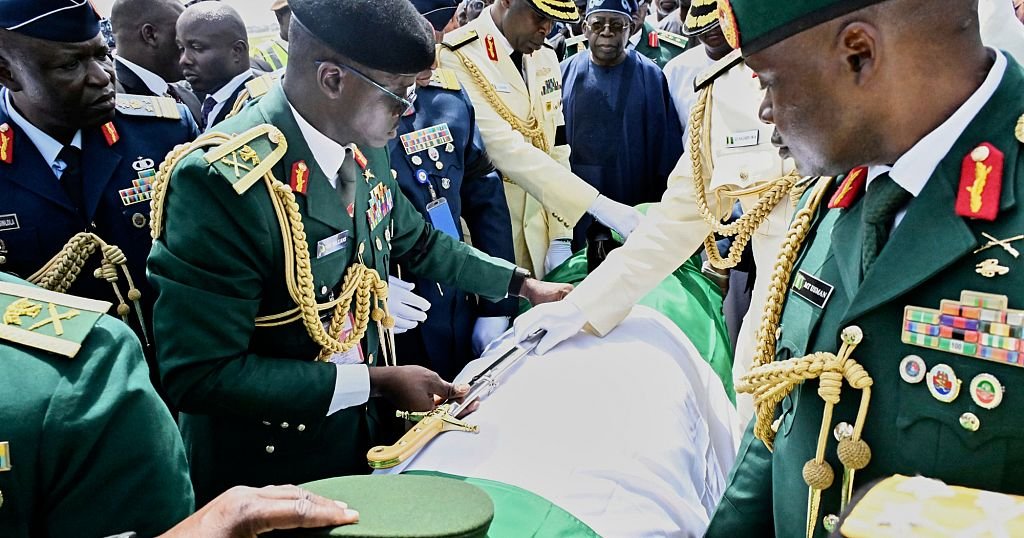
Nigeria’s former president Muhammadu Buhari was buried Tuesday in his hometown of Daura in northwestern Nigeria, where thousands of people lined the streets to say their goodbyes.
Buhari died Sunday in London, where he had been receiving medical treatment.
He first took power in Africa’s most populous nation in 1983, after a military coup, running an authoritarian regime until fellow soldiers ousted him less than 20 months later.
When he was elected in 2015 on his fourth attempt, he became the first opposition candidate to win a presidential election there.
Buhari rode into power in that election on a wave of goodwill after promising to rid Nigeria of chronic corruption and a deadly security crisis.
He led the country until 2023, during a period marked by Boko Haram’s extremist violence in the northeast and a plunging economy.
Current President Bola Tinubu in a statement described Buhari as “a patriot, a soldier, a statesman … to the very core.” Tinubu dispatched the vice president to bring Buhari’s body home from London.
Others across Nigeria remembered Buhari as a president who left the country of more than 200 million people — divided between a largely Muslim north and Christian south — more at odds than before.
For many, Buhari will be linked with memories of the 2020 youth protests against a police unit accused by rights groups and others of extrajudicial killings, torture and extortion — and the deadly shootings of demonstrators by soldiers.
Coming from Nigeria’s north, the lanky, austere Buhari had vowed to end extremist killings and clean up rampant corruption in one of Africa’s largest economies and oil producers.
By the end of his eight-year tenure, however, goodwill toward him had faded into discontent.
Insecurity had only grown, and corruption was more widespread.
Nigeria also fell into a recession amid slumping global oil prices and attacks by militants in the sprawling oil-rich Niger Delta region.
The currency faltered as Buhari pursued unorthodox monetary policies to defend its fixed price to the dollar, and a massive foreign currency shortage worsened.
Inflation was in the double digits.
Civil society accused him of authoritarian tendencies after protesters were killed during a protest against police brutality and over his decision to restrict access to social media, as young people vented their frustrations against economic and security problems.
Buhari’s attempts at managing the problems were complicated by prolonged medical stays abroad.
His absences, with few details, created anxiety among Nigerians and some calls for him to be replaced.
There also was anger over his seeking taxpayer-funded health care abroad while millions suffered from poor health facilities at home.
Africa
France shuts down last military base in Senegal after 65 years
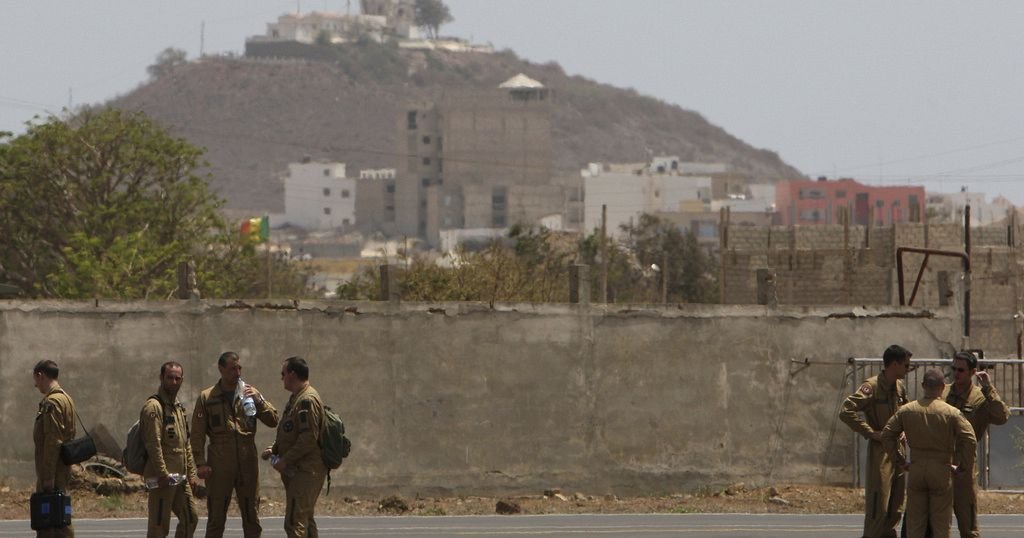
France returned its last two military bases to Senegalese forces Thursday morning amid a wave of anti-French sentiment in West Africa.
General Mbaye Cissé and Chief of the French command in Africa, Pascal Ianni, oversaw the official handover ceremony in Dakar, which marks the end of France’s 65-year presence in Senegal.
“This is an important turning point in the rich and long military history between our two countries.” General Cissé said in his speech during the event.
He noted that the French and Senegalese armies had “defined new objectives” to “give new meaning to the security partnership” between the two countries.
“The Senegalese armed forces are looking forward to consolidating the many achievements made in the quest for strategic autonomy,” he concluded.
The French army has had a permanent base in Senegal since the country’s independence from France in 1969. Camp Geille, where around 350 French soldiers are stationed, is the last base to return to Senegalese command after several other military installations have been shut down since March last year.
Senegal pushes to end French influence
In December, President Bassirou Diomaye Faye declared that his government would work towards ending foreign military presence on Senegalese soil by 2025.
The announcement followed growing criticisms of neo-colonial influence in Senegal, which culminated in several French-owned businesses being torched and looted during mass demonstrations in 2021.
“Senegal is an independent country, it is a sovereign country, and sovereignty does not accept the presence of military bases in a sovereign country,” Faye said to AFP.
Several scandals have soured the relationship between Senegal and its former colonial ruler. Faye announced the closure of French military bases on the 80th anniversary of the mass killings of West African soldiers by French forces.
Members of the Tirailleurs Senegalais unit, who fought in France’s war against Nazi Germany, had been protesting delays in salaries and poor living conditions when colonial soldiers shot them.
President Emmanuel Macron sent a letter to President Faye this year, admitting that France committed a “massacre”.
France’s waning diplomatic influence in West Africa
The closure of the Senegalese military operation is just the latest diplomatic blow to France as a wave of French-critical governments have ascended to power in West Africa.
Coups in France’s former colonies, Burkina Faso, Niger and Mali from 2020 to 2023 have resulted in the ejection of 4,300 French soldiers, with military leaders cutting ties with France in favour of new allies, including Russia.
In 2022, France pulled out of the Central African Republic, and earlier this year, France handed over its last bases in Ivory Coast and Chad. The base in Djibouti remains France’s last permanent mission in Africa, with approx. 1500 soldiers stationed.
Africa
New US law targets fentanyl-related copycat drugs driving overdose deaths
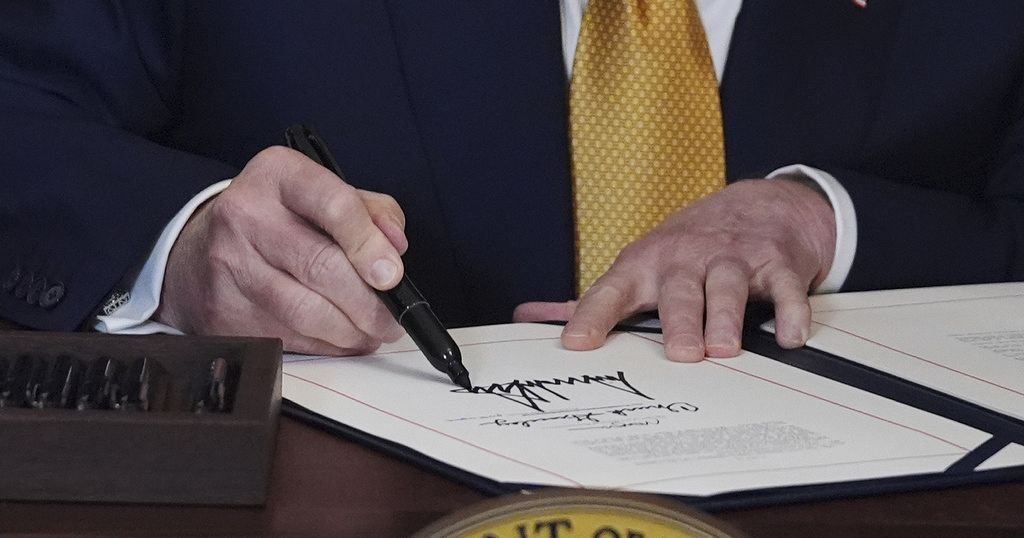
US President Donald Trump has signed into law a bill aimed at quelling the fentanyl crisis sweeping America.
The law targets all fentanyl-related drugs, including copycat versions of the potent opioid that evade current US regulations.
Illegal forms of the drug, often made in China, have been driving US overdose deaths for years.
“With this bill, we are officially and permanently classifying all fentanyl related substances as Schedule 1 narcotics, which is actually a very big deal,” Trump said at a signing ceremony at the White House on Wednesday.
“That doesn’t sound like much. It’s a big deal, as they will tell you. Meaning, anyone caught trafficking these illicit poisons will be punished with a mandatory ten year minimum sentence in prison. We’ll be getting the drug dealers, pushers and peddlers off our street and we will not rest until we have ended the drug overdose epidemic. And it’s been getting a little bit better, but it’s horrible. It’s horrible.”
More than 70,000 Americans died of opioid overdose in 2023, according to official statistics. That number has dropped significantly in the last year but as of February 2025, overdose remains the leading cause of death for Americans aged 18-44, according to the US Centers for Disease Control and Prevention.
Doctors sometimes prescribe fentanyl for severe pain. The legislation does not affect fentanyl when used for medical purposes.
Africa
Eswatini says it will repatriate immigrants deported by United States
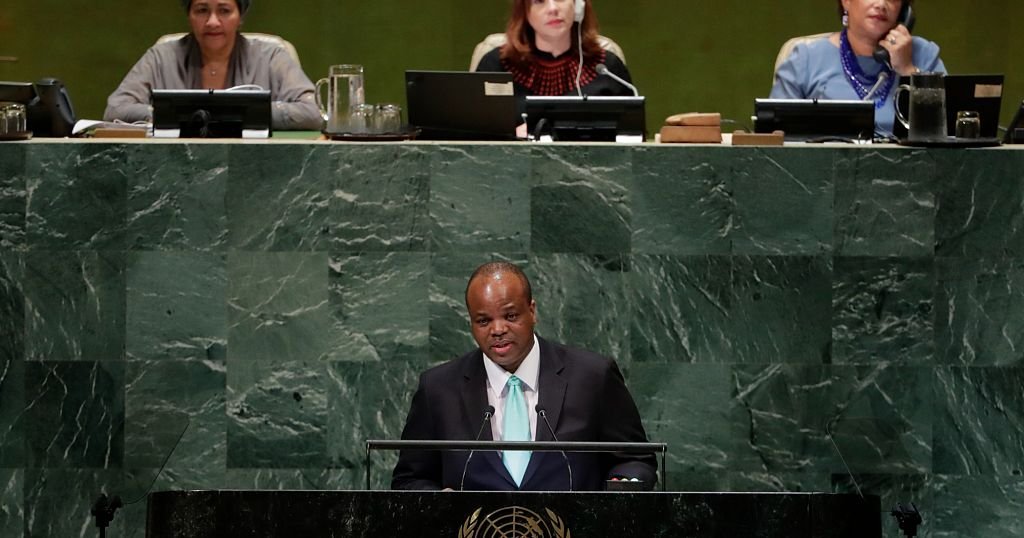
Eswatini announced on Wednesday that it would repatriate the five immigrants deported there by the United States.
In a late-night post on X Tuesday, US Homeland Security Assistant Secretary Tricia McLaughlin said five men — citizens of Vietnam, Jamaica, Cuba, Yemen and Laos — had been deported to Eswatini.
She said they were all convicted criminals and “individuals so uniquely barbaric that their home countries refused to take them back.”
Eswatini became the latest nation to take part in the Trump administration’s third-country deportation programme.
The kingdom’s involvement drew some criticism from the opposition.
“We condemn the bringing of hardcore convicts to our country to mix with our young convicts who still have a chance to be rehabilitated”, said Mphandlana Shongwe, a political activist from the People’s United Democratic Movement.
“We can approach the courts, the International Court of Justice, or any other legal institutions to possibly complain.”
Prince Bailey, from the Swaziland United Democratic Front, said the deportations made Eswatini look like “a dumping site [for] those people that the American government view as unworthy to be in their own country.”
Eswatini government spokesperson Thabile Mdluli said in a statement that the deportees paused “no security threat to the nation” and were being held in correctional facilities within isolated units while “on transit.”
She said the country was working with the US and the International Organization for Migration to “facilitate” their repatriation. The government gave no timeframe for that to happen.
The US has already deported eight men to another African country, South Sudan, after the Supreme Court lifted restrictions on sending people to countries where they have no ties.
The US also has sent hundreds of Venezuelans and others to Costa Rica, El Salvador and Panama.
-
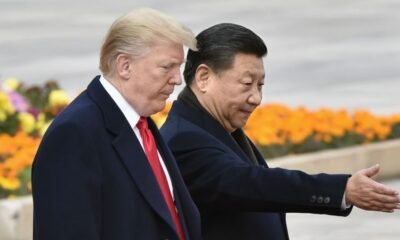
 Asia5 days ago
Asia5 days agoThe deadly drug that’s complicating US-China trade
-

 Lifestyle5 days ago
Lifestyle5 days agoHungary’s oldest library is fighting to save 100,000 books from a beetle infestation
-

 Lifestyle3 days ago
Lifestyle3 days agoA rap festival near the Arctic Ocean delights crowds under the midnight sun
-
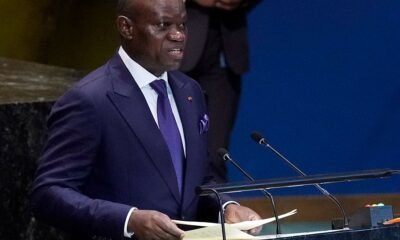
 Africa4 days ago
Africa4 days agoGabon launches electoral process for September 27 local and legislative elections
-

 Europe4 days ago
Europe4 days agoGOP senators tout Russia sanctions bill as ‘sledgehammer’ for Trump to end war
-

 Europe4 days ago
Europe4 days agoUkraine says it killed Russian agents suspected of assassinating intelligence officer
-

 Europe4 days ago
Europe4 days agoCole Palmer leads Chelsea to dominant victory over PSG to win FIFA Club World Cup
-
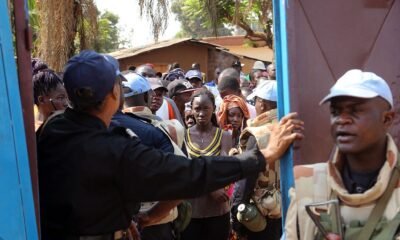
 Africa4 days ago
Africa4 days agoForty years and counting: CAR once again postpones local elections




